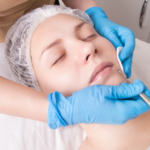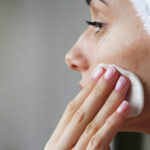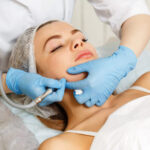
When you’re struggling with acne-prone skin, it can take a toll on your self-worth. However, there are practical habits you can cultivate that will eliminate the issue or decrease the severity. Keep in mind, deep and cystic acne is caused by hormonal problems and cannot be fixed on the surface, only treated. However, if you’re getting a lot of surface pimples and blackheads, you may just need to change your skincare routine. The key is to learn what your skin likes the most. Once your skin begins to respond to a treatment in a positive manner, maintain it. Consider the following ways you can work to improve your skin.
1. Avoid Harsh Chemicals
Harsh chemicals can be found in many over-the-counter products. While these chemicals may seem like the most effective way to take out your acne, they are meant to be used short term to knock out a particular breakout. Long term use of harsh chemicals should only be used under the instruction and care of a dermatologist for severe and persistent cases. While the tougher stuff may show more immediate results, they won’t be as long-lasting as a regular skincare routine with gentle soaps and moisturizers. It’s also good to make sure you look for product lines that use natural, organic ingredients, as these are less likely to strip your skin of important oils and acne-fighting bacteria.
2. Avoid Hard Water
If you have hard water, your skin will suffer for it. Hard water, as the name implies, is much harder on the skin and hair than soft or treated water. The harsh chemicals in hard water strip your hair and skin of oils that keep them healthy, making your hair brittle and your skin overproduce its oils in order to keep up. Dry skin also develops breakouts much easier because it inhibits natural exfoliation. If you’re getting hard water in your system, consider contacting a plumber to install a water softener for your home. If doing so is beyond your budget, consider getting a smaller version to attach to your sink or faucet, and a filter for your showerhead.
3. Exfoliate Correctly
When you have acne, your skin is already experiencing its own form of trauma. Do not make it worse by using a grainy product to rip at your skin. Using an exfoliating scrub every day will damage your skin and make it more prone to breakouts. It is even suggested that you dab at your face instead of scrubbing it with a towel to dry it. It is still important to exfoliate, however, so exfoliating with a gentle scrub once a week, or twice a week with a towel, will aid your body in the natural process of shedding dead skin.
4. Cleansing Masks
Oftentimes, acneic skin is very oily. The oil clogs the pores, which results in pimples and blackheads. Use a facial steamer to open up the pores. Then, apply a deep-cleansing mask once a week. Doing these treatments more often can be damaging to your skin, as with exfoliation, so be sure to limit your use and avoid harsh chemicals and materials. Also, make sure that you’re not doing this and exfoliating treatments at the same time, and may consider alternating treatments every other week.
For acneic skin, the most effective option for a cleansing mask is clay. A clay-based mask will absorb the oil, pull out the dirt and cleanse the pores. Once you’ve rinsed off the mask with warm water, immediately use a toner and moisturizer to replenish the moisture. When people have oily skin, they make the mistake of thinking they don’t need to moisturize. Never skip this step. Moisturizing will decrease the skin’s innate desire to overcompensate with more oil.
5. Makeup Removal
Before bed, you should always cleanse your skin. However, this is especially true for anyone who uses makeup. Use makeup cleansing wipes to get the creams and powders off. Then, use a thorough cleanser to remove any traces of makeup. While you sleep, your skin gets a chance to repair itself. Give it room to do so and don’t leave makeup particles behind to be trapped in the pores to restrict the oil flow.
Acne, like any skin condition, is treatable and should only be a temporary problem. Keep in mind, factors like stress, touching your face, picking at skin, and hormonal imbalances will cause acne regardless of a perfect cleansing routine and should be addressed separately. However, most cases of adult acne are a simple case of an improper care routine. Try these tips and give your skin at least six months to completely adjust to the new treatment, as it takes time for the old chemicals and problems to flush out.
- 6 Ways To Make an Evening With Friends a Little More Special - October 15, 2023
- Tired of Putting Up With Pain? Alternative Solutions to Chronic Pain - August 9, 2023
- Getting Back on Your Feet After a Serious Accident - July 20, 2023






